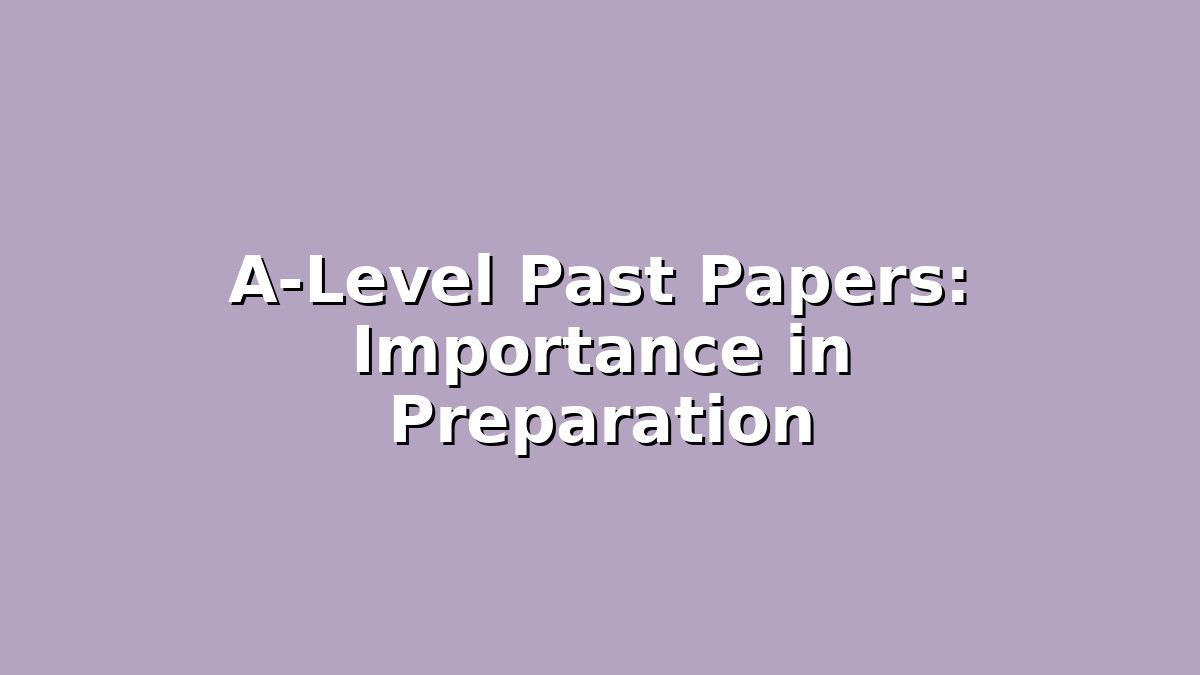Preparing for A-Level exams can feel overwhelming, especially with the vast amount of content you need to cover. However, one of the most effective tools at your disposal is often overlooked: A-Level past papers. These past exam papers are invaluable resources that can significantly boost your confidence and improve your exam performance. In this article, we’ll explore why A-Level past papers are so important, how to use them effectively, and tips to maximize your study time using these resources.
Why A-Level Past Papers Are Crucial for Exam Success
When it comes to preparing for A-Level exams, understanding the syllabus and reviewing your notes is essential, but practicing with past papers is what bridges the gap between knowing the content and applying it in an exam setting. Past papers provide several key benefits:
1. Familiarity with Exam Format and Question Types: Each exam board has a specific style and structure. By working through past papers, you’ll get used to the format—whether multiple-choice, long-form essays, or problem-solving questions. This familiarity reduces anxiety because you know what to expect on exam day.
2. Understanding Marking Schemes and Examiner Expectations: Along with the papers, examiners’ reports and marking schemes help you understand how answers are graded. This insight teaches you how to structure your responses and what examiners look for, helping you earn maximum marks.
3. Time Management Practice: A-Level exams are timed, and many students struggle to complete all questions within the allocated time. Working under timed conditions with past papers trains you to allocate time wisely across different sections, improving your speed and accuracy.
4. Identifying Knowledge Gaps: When you attempt questions from past papers, you quickly identify areas where your understanding is weak. This targeted feedback allows you to focus your revision on topics that need improvement instead of spending time on what you already know well.
How to Use A-Level Past Papers Effectively
Simply downloading past papers and randomly attempting questions is not enough. To maximize their benefit, you need a strategic approach:
1. Start Early and Make It Regular: Don’t wait until the last few weeks to start practicing past papers. Begin incorporating them into your study schedule early in your revision period. Regular practice helps reinforce learning and builds exam stamina.
2. Simulate Exam Conditions: When you sit down to complete a past paper, recreate exam conditions as closely as possible. Find a quiet space, time yourself strictly, and avoid using notes or textbooks. This practice helps you build concentration and reduces exam-day nerves.
3. Review Your Answers Thoroughly: After completing a paper, spend time marking your work using the official marking scheme. Be honest in your assessment. For incorrect or incomplete answers, refer back to your textbook or class notes to clarify your mistakes.
4. Use Examiner Reports: Many exam boards publish reports detailing common student errors and what examiners expect. Reviewing these can provide valuable insights that improve your technique and content accuracy.
5. Focus on Quality, Not Quantity: It’s tempting to do as many past papers as possible, but focus on doing fewer papers well, deeply understanding each question and answer. Quality revision beats rushing through numerous papers without reflection.
Study Tips to Complement Past Paper Practice
While past papers are powerful tools, combining them with effective study habits will maximize your chances of success.
1. Create a Revision Timetable: Organize your study time by breaking down the syllabus into manageable chunks. Allocate slots for past paper practice, content revision, and rest. A balanced timetable keeps you consistent and reduces last-minute cramming.
2. Active Revision Techniques: Use active revision methods such as flashcards, mind maps, or teaching topics aloud to yourself or friends. Active learning helps reinforce memory far better than passive reading.
3. Group Study Sessions: Studying with peers can help you tackle past paper questions collaboratively. Explaining concepts to others and hearing different perspectives deepens your understanding.
4. Seek Feedback from Teachers: When possible, ask your teachers to review your past paper answers. They can provide targeted advice and help you refine your exam technique.
5. Stay Positive and Manage Stress: Exam preparation can be stressful. Incorporate relaxation techniques like deep breathing, exercise, and hobbies to keep your mind fresh and focused.
Conclusion
A-Level past papers are one of the most effective resources available for exam preparation. They offer a unique way to familiarize yourself with exam formats, improve time management, identify knowledge gaps, and understand examiner expectations. However, the key is to use them strategically—starting early, simulating real exam conditions, and reviewing your answers carefully.
Combine past paper practice with active revision techniques, regular study schedules, and healthy stress management to build confidence and improve your exam performance. Remember, success in A-Levels is not just about hard work but working smart. Embrace past papers as your study companions, and you’ll be well on your way to achieving your academic goals.
Good luck with your exam preparation!

Responses